Protectors of Online Gambling Sites at the Communication and Digital Affairs Ministry
The number of people suspected of protecting online gambling sites increases to 18. Employees of the Communication and Digital Affairs Ministry are involved.
maaf email atau password anda salah
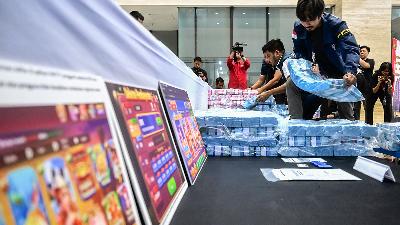
The number of people suspected of protecting online gambling sites increases to 18. Employees of the Communication and Digital Affairs Ministry are involved.

The Communication and Digital Affairs Ministry is tidying up house now that 10 of its employees are accused of participating in online gambling. Their flow of cash is being scrutinized.
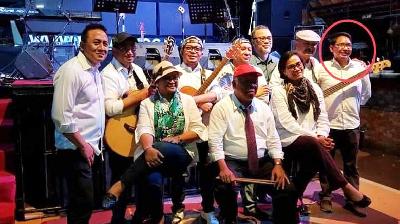
One of the suspects of the online gambling case is a regular in the ministers’ social circles, and active in the arts scene.

Minister of Higher Education, Science and Technology Satryo Soemantri Brodjonegoro explains BRIN’s position in the Prabowo government.
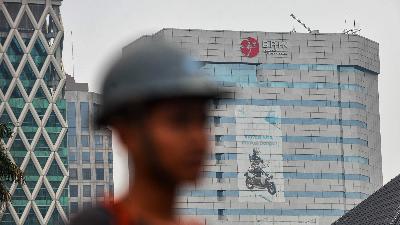
The position of BRIN remains uncertain under Prabowo Subianto’s administration. The restructuring of the research agency is hampered by political interests.

Danantara will reduce the authority of the SOEs Minister. Transferring the management of major SOEs will make the Ministry almost powerless.
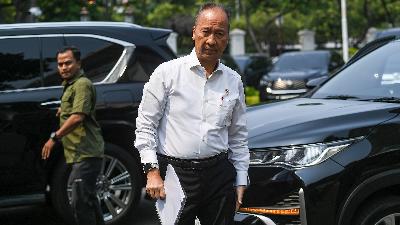
Interviews with Industry Minister Agus Gumiwang Kartasasmita and Sritex President Commissioner Iwan Setiawan Lukminto on the company’s bailout.
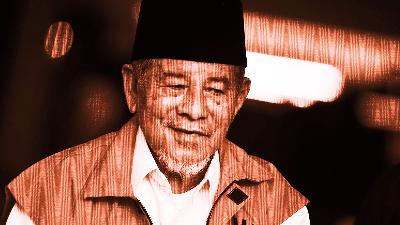
The term “Medan Block” emerged during the trial of former North Maluku Governor, Abdul Gani Kasuba. Medan Block is believed to refer to pre-allocated nickel mining concessions in Halmahera.
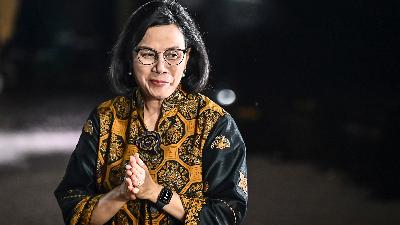
Sri Mulyani and several economic ministers from Jokowi join Prabowo’s cabinet, with encouragement from two former presidents.
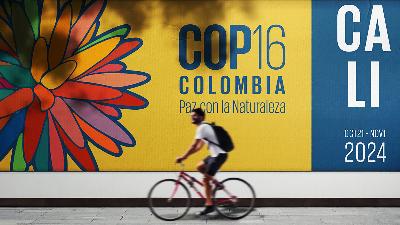
Indonesia’s delegation at COP16 CBD in Cali, Colombia, is not led by a minister. Biodiversity funding is at risk of not being agreed upon.

A number of policies from Minister Sakti Wahyu Trenggono are riddled with conflicts of interest. They benefit his son, Indra Trenggono.

Explanations from State Secretary Minister Pratikno and Maritime Affairs and Fisheries Ministry on fishery business and the case of illegal ships in eastern Indonesia.
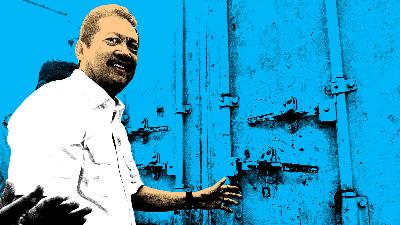
Minister Sakti Wahyu Trenggono revives a shutdown port. There is indication that the minister’s son is involved in the fisheries business.
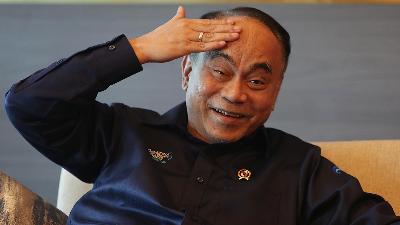
Tempo’s interview with Minister of Communication and Informatics Budi Arie Setiadi about Jokowi’s campaign before the end of his tenure.
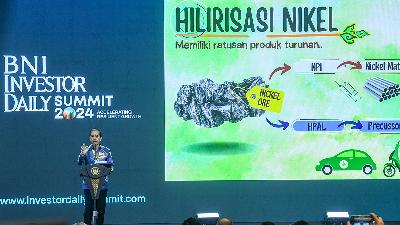
Jokowi’s campaign promoting his successes is considered as not portraying actual conditions. Customary communities are among the victims of his administration.
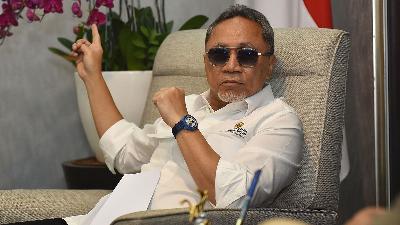
Trade Minister Zulkifli Hasan on the issues ranging from sea sand export policy to Prabowo Subianto’s bureaucratic management style.

There is a strong aroma of politics around the appointment of Saifullah Yusuf as Minister for Social Affairs. President Jokowi should focus on dealing with the problems of poverty.
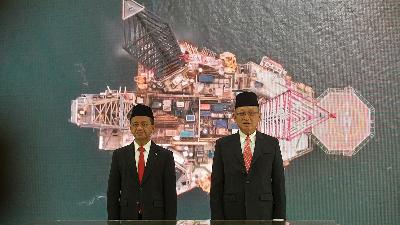
Just months before the end of his term, Jokowi appointed Bahlil Lahadalia as Energy and Mineral Resources Minister. The position is considered prone to conflicts of interest.
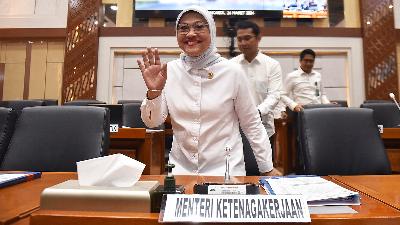
Minister of Manpower Ida Fauziyah explains the issues surrounding the mass layoffs in the industrial sector.

The willingness on the part of Muhammadiyah and Nahdlatul Ulama to accept mining concessions will turn into a problem. This is prone to corruption and could lead to horizontal conflicts.
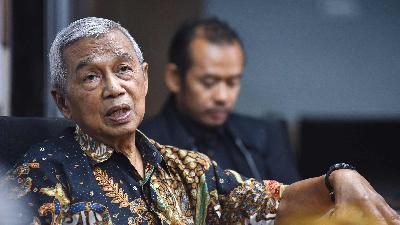
Muhammadiyah accepts the government’s mining concession offer. Many members are against it. Busyro Muqoddas, Chair of Muhammadiyah’s Law and Human Rights Council explains.

Muhammadiyah cadres and administrators are divided in their response to the mining concession. There are whispers from the government and the entrepreneurs.
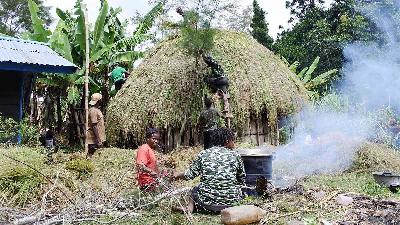
The Papua conflict continues to rage during Jokowi’s administration. The fate of the refugees is neglected.
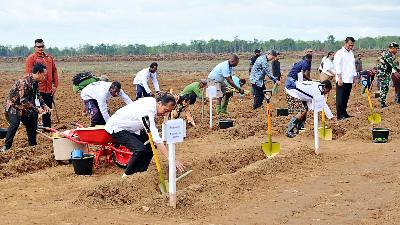
In a decade of Jokowi’s administration, deforestation reached 4.37 million hectares. This is partly attributed to national strategic projects in the food and energy sectors.
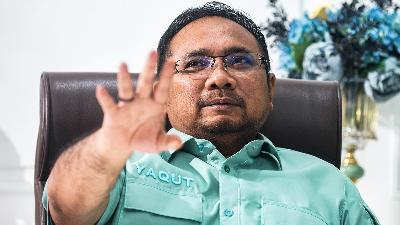
The DPR and the Religious Affairs Minister disagree regarding an additional quota of haj pilgrims. The DPR deems Yaqut Cholil Qoumas has broken the law.

The Ministry of Education, Culture, Research and Technology clarified the matter of the network of professor assessment teams. It is suspected that journals were engineered in addition to suspicious transactions.
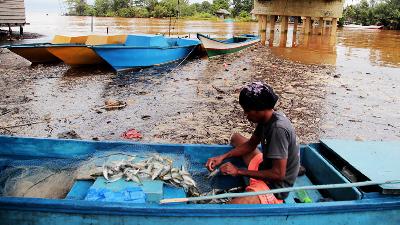
Indigenous people and villagers in Central Halmahera are facing clean water crisis. Community wells and river water are contaminated by nickel mining.
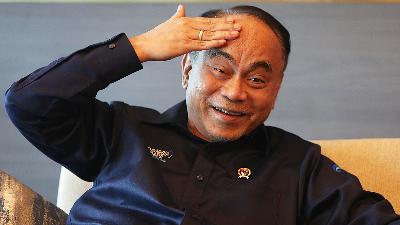
Communication and Informatics Minister Budi Arie explains the cyberattack on the Temporary National Data Center. He dismisses allegations of negligence.

Infinite Earth responds regarding the revocation of Rimba Raya Conservation’s ecosystem restoration permit.

The government grants mining concessions to religious organizations. What are the considerations behind the policy?
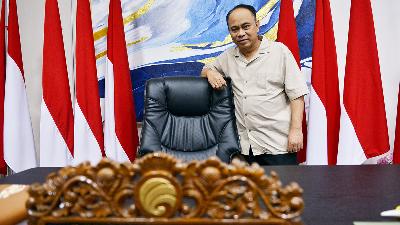
Communication and Informatics Minister Budi Arie Setiadi talks about the polemic over the planned revision of the Broadcasting Law and the Starlink Internet service.
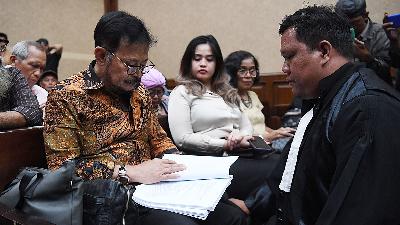
Agriculture Ministry high-ranking officials routinely took up collections to raise money for Syahrul Yasin Limpo from 2020 to 2023. They often used the treasurer’s cash account.
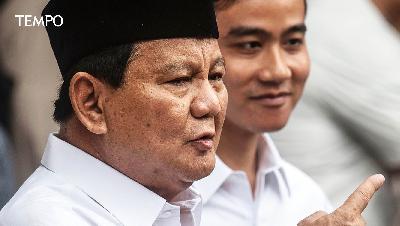
Prabowo Subianto intends to form a cabinet of 40 ministers. This will result in a bloated bureaucracy and wasted public money.
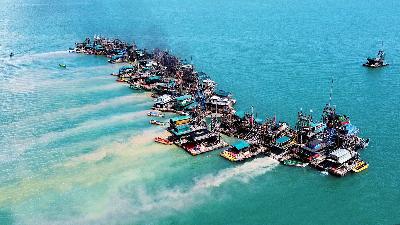
Illegal tin mining is rampant in the waters of Bangka Belitung. The environmental damage is much greater than investigators estimated.
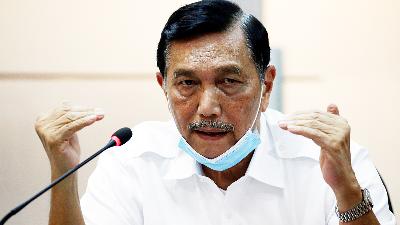
An interview with Coordinating Minister for Maritime Affairs and Investment Luhut Pandjaitan on mining permits for mass organizations and his relationship with Bahlil Lahadalia.
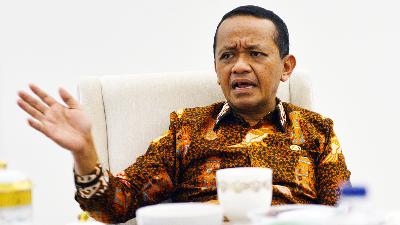
Interview with Minister of Investment Bahlil Lahadalia about mining business permits IUP for mass organizations, and the debate with Luhut Pandjaitan.
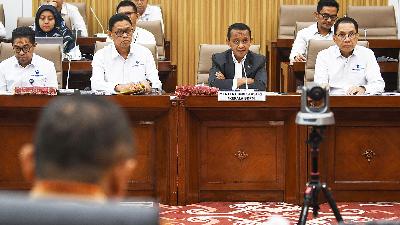
The role of Bahlil Lahadalia in revoking mining business licenses draws attention of the House of Representatives and civil society groups, amidst concerns of possible licensing corruption.
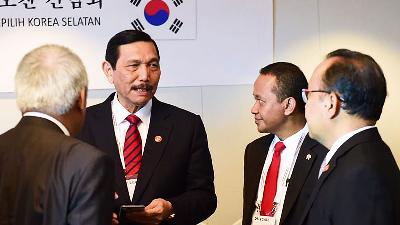
Luhut Pandjaitan and Bahlil Lahadalia discussed the allocation of mining permits. For the sake of delivering Jokowi’s promise.

The legalization of illegal mining and oil palm plantations in forest areas is rife with irregularities. This is plundering of natural resources using the Job Creation Law.
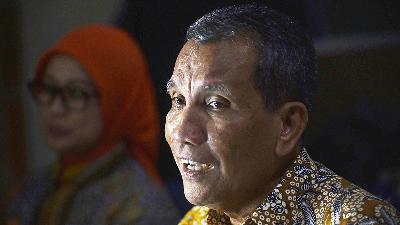
Corruption Eradication Commission’s Deputy for Prevention, Pahala Nainggolan, on the mechanism of administrative sanctions for companies mining illegally in forest areas.
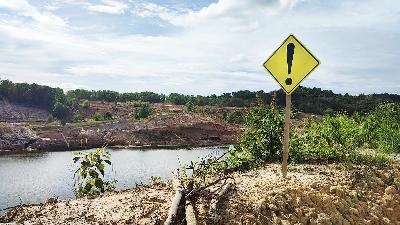
Administrative fines for whitewashing illegal mining are deemed ineffective to battle environmental damage. The fines are also vulnerable to corruption.
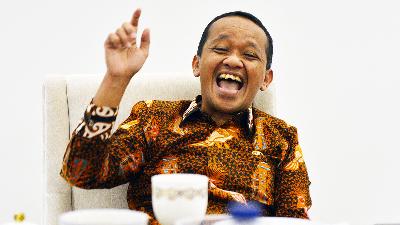
Bahlil Lahadalia explains the uproar over the revocation of mining permits as well as alleged extortion of money and shares in exchange for reinstatement of the permits.
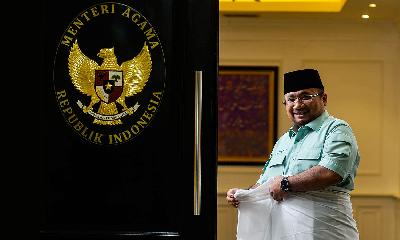
Religious Affairs Minister Yaqut Cholil Qoumas explains the regulation regarding the use of loudspeakers in mosques and outlines plans to ensure that religious affairs offices provide services for all faiths.

The declining trade surplus is the culprit of the rupiah’s weakening recently. Partly, it is the fruit of the government’s own doing.

The Attorney General's Office is investigating alleged corruption over tin mining permits in Bangka Belitung. The investigation must also reveal the backers.

Three Timah directors become suspects in a tin mining corruption case in the Bangka Belitung Islands. Estimated losses sustained by the state amount to Rp217 trillion.
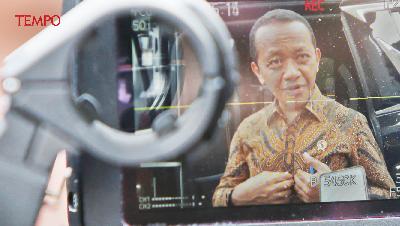
Investment Minister Bahlil Lahadalia has revoked mining permits and then reissued them. There are indications of illegal buying and selling of permits.
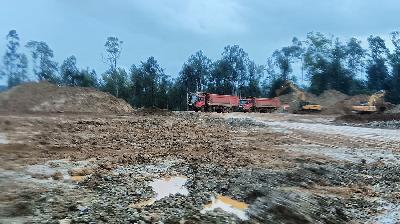
Deforestation and illegal nickel mining continues in Halmahera. It became widespread after Minister Bahlil revoked some mining licenses.
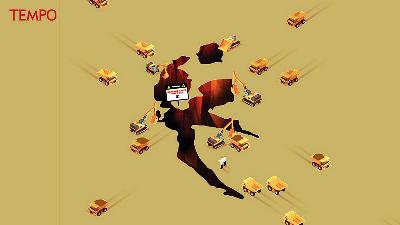
Allegedly, there are tributes to Investment Minister Bahlil Lahadalia. This coverage is supported by International Media Support
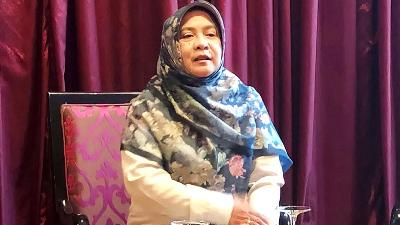
An interview with the Ministry of Environment and Forestry’s Director-General of Climate Change Mitigation Laksmi Dhewanti about the REDD+ program.
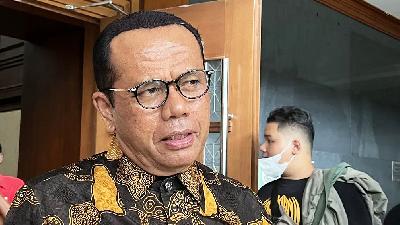
An interview with Juniver Girsang, the lawyer of Fajar Bhakti Lintas Nusantara directors, on the role of the Coordinating Minister for Maritime Affairs and Investment Luhut Pandjaitan in the internal dispute of a nickel company.

Ministry of Religious Affairs and Ministry of Agriculture’s right of reply on support for presidential candidates.

What are the functions of the cabinet minister’s special staff?
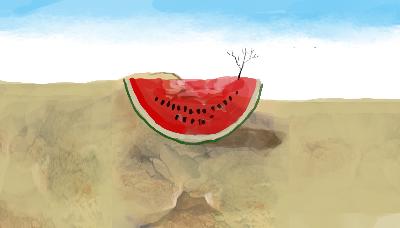
The Palestinian homeland neither originates from the distant past, nor is it a hope for the future.

A number of President Joko Widodo’s ministers campaign for their respective political parties ahead of the 2024 elections. How to scrutinize a possible misuse of state facilities?
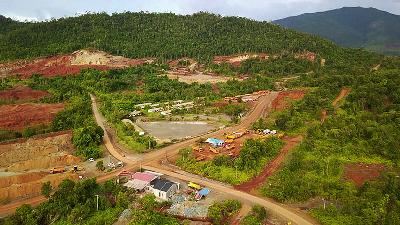
Helmut Hermawan, who admitted to bribing Deputy Justice and Human Rights Minister Eddy Hiariej, is indicted in 11 criminal cases. It is the fallout from fighting over company stocks.

The water of the Sagea River in North Maluku is polluted by nickel mining. The environmental danger is becoming more real as the price of nickel on world markets plummets.
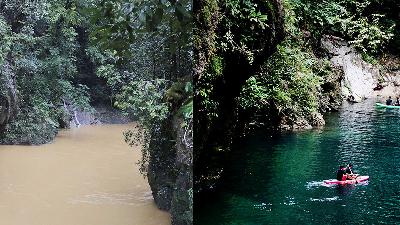
Sagea River is polluted as a result of deforestation by a number of nickel mining companies. Its water is no longer safe for drinking.

Syahrul Yasin Limpo is the sixth of Jokowi's ministers to be caught up in a corruption case. This is a sign of failure in the recruitment of cabinet members.

The appointment of the Environment Ministry Director-General of Planning appears to have been made based on a forged signature. His track record is also controversial.
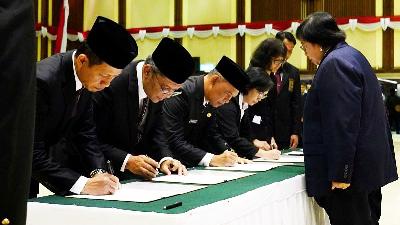
The signature of Sarwono Kusumaatmadja was used to validate the names of candidates for echelon-I officials of the Environment and Forestry Ministry. The announcement letter was issued when he was hospitalized in Malaysia.

Former government employees at the Foreign Affairs Ministry are demanding the disbursement of unpaid wages. How did it come to happen?

The National Genome Center set up in 2018 is gone. Does it change into the Biomedical and Genome Science Initiative of the Health Ministry?
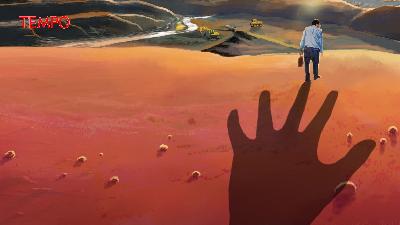
A former campaign volunteer for President Jokowi is named a suspect in relation to an illegal nickel mining worth Rp5.7 trillion. A crooked syndicate that must be investigated.
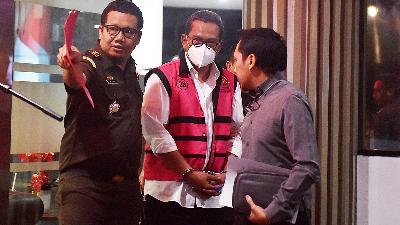
Businessman Windu Aji Sutanto is caught up in a case of illegal nickel mining at the Mandiodo Block. He is known as a broker for arranging the outcomes of legal cases.
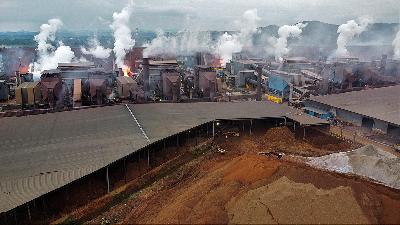
The mining downstreaming policy gives rise to issues. Mineral processing has not been optimal without processed materials being absorbed by manufacturing industries.

Minister Mahfud Md’s statement regarding a loan claim by Jusuf Hamka could be considered influence peddling. This is treading on very thin ice.
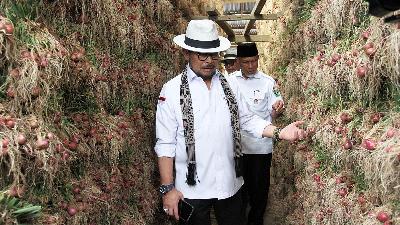
Through people close to him, Agriculture Minister Syahrul Yasin Limpo allegedly received tributes to fund his personal needs.
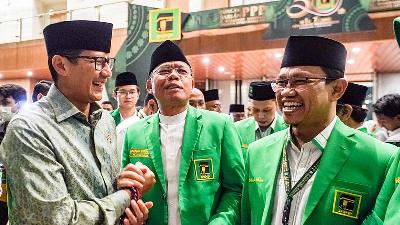
Sandiaga Uno and Erick Thohir are cozying up to political parties. Even opposition parties have been lobbied to support the current administration.

Small islands face the threat of disappearing under the water as a result of the sand mining. This worsens the abrasion caused by rising sea levels.
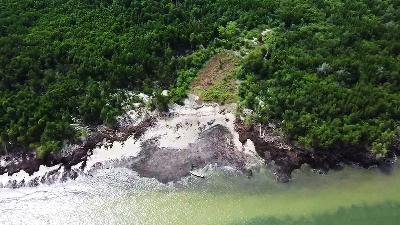
Sand mining exacerbates threats for smaller islands. It creates environmental damage and less catch for fishermen.

Police seized a Lamborghini Aventador with a fake license plate from a Russian tourist. The car disappeared twice.
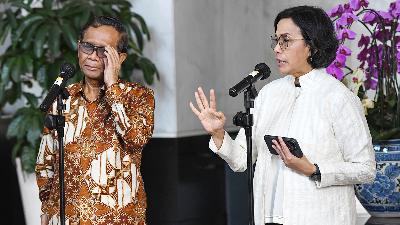
A summary of the week’s news on the huge transactions discovered in the finance ministry, the transfer of the Haris-Fatia case to the prosecutor's office, and the verdict received by the Kanjuruhan Tragedy defendants.

An investigation by Tempo found illegal nickel mining by people claiming to be close to the authority.
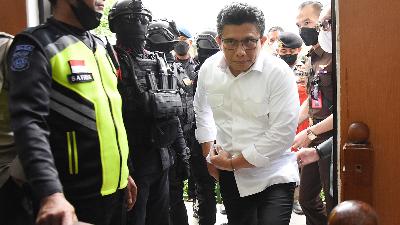
Ferdy Sambo, who is currently facing trial in the case of the killing of his adjutant, is suspected to be connected to an illegal mining bribery case involving Ismail Bolong.
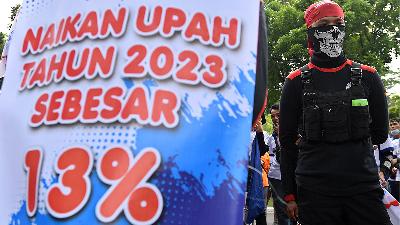
Discussions to decide the provincial minimum wage for 2023 get hot. Workers are lobbying the president to issue a discretion, while employers are suing manpower minister regulation.

Minister Erick Thohir promises to ban former corruptors from becoming directors of state-owned enterprises. Mere gimmicks are inadequate for a comprehensive cleanup of state-owned enterprises.

Nadiem Makarim has outside teams attached to some directorate-general offices at the Ministry of Education, Culture, Research and Technology. Consisting of about 400 people, these shadow organizations create waves inside the ministry.
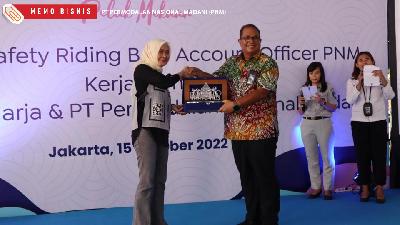
PT PNM put 100 Jakarta Branch Account Officers as training participants so they can be more aware and obey the traffic rules. #Infotempo

Barring the entry of five foreign researchers underlines the anti-science and anti-criticism stance of Environment and Forestry Minister Siti Nurbaya. This is a danger for the environment.
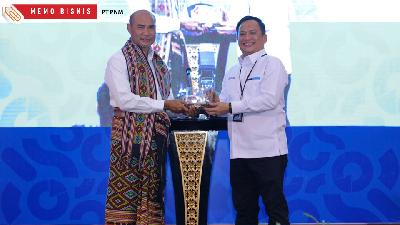
The training and provision of NIB is one of the supports for MSMEs in advancing the people's economy. #Infotempo

The Agriculture Ministry has a letter on the right of reply to Tempo’s report about the procurement of the foot-and-mouth disease vaccines.
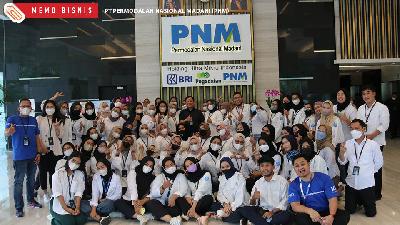
Through this training and mentoring, PNM builds emotional relationships and provides support to customer assistants. #Infotempo

Through this training and mentoring, PNM builds emotional relationships and provides support to customer assitants. #Infotempo
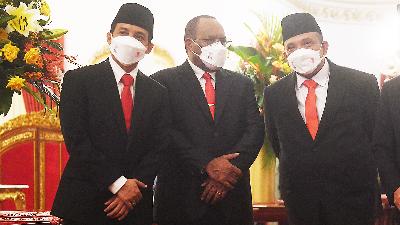
President Joko Widodo again chooses deputy ministers from political parties. It is part of his accommodation politics.
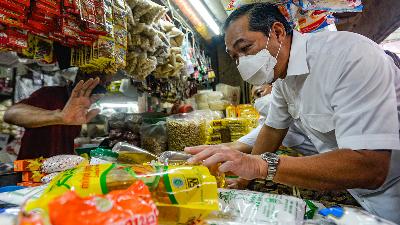
The attorney general names Lin Che Wei the fifth suspect in the graft case surrounding the export of crude palm oil and its derivatives. Investigators are also looking into Trade Minister Muhammad Lutfi’s role in the affair.

The police are investigating Rudy Salim following videos of the sale of a Lamborghini Huracán to a binary option fraud suspect, Indra Kenz. The car should not have been sold because it was imported using the ATA Carnet facility.
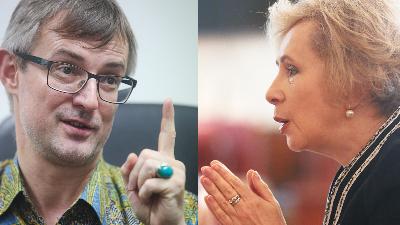
Russian Ambassador to Indonesia, Lyudmila Vorobieva, claims that the assault on Ukraine is carried out to prevent the country from being used as a weapon to attack Russia.
Meanwhile, Ukrainian Ambassador to Indonesia, Vasyl Hamianin points out that it is wrong for Russia to use such fear as an excuse to invade Ukraine and kill civilians in the process.

Letters on a note to Minister Nadiem Makarim, digital detoxification and the US-China tension.

The inspectorate-general at the ministry of education, culture, research and technology backs the accusations of plagiarism against the rector of the Semarang State University. This is a stain on the face of the education system.
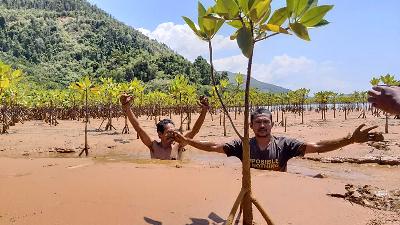
Local communities protested against Aneka Tambang for polluting the mangrove area in Tanjung Moronopo, East Halmahera North Maluku, with waste from its mining operation. The mine is changing both the waters and the lives of fishermen.

Objection of the Ministry of Villages Regarding a Government Official Suspected of Brokering Personnel Recruitment.
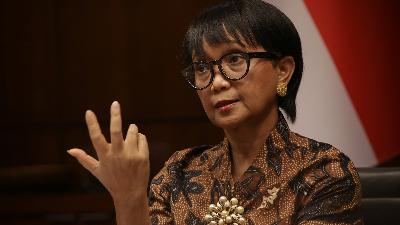
ASEAN leaders finally came to a number of consensus, such as finding a peaceful solution through dialogue and sending a special envoy to Myanmar. Further steps are still needed. Tempo interviewed Indonesian Minister of Foreign Affairs, Retno marsudi.

Ministry of Villages, Disadvantaged Regions, and Transmigration writes a response to the article titled Fees for Positions in Kalibata in Tempo English April 12-18, 2021 issue.

Taman Mini reflects the view that life is only the status quo—as though in every phenomena, every difference, there is only the everlasting.
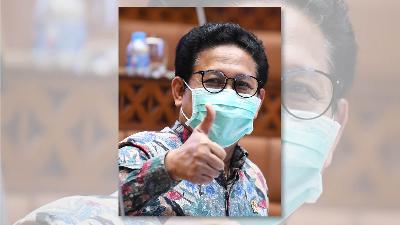
Alleged trading of postings within the Villages Ministry shows a major flaw in the practice of good governance. Placement of politicians in ministries are most often problematic.
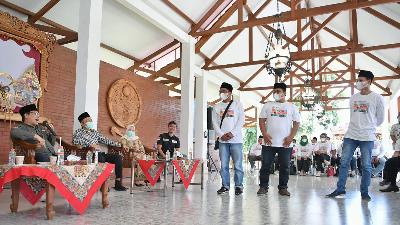
Problems abound for village assistants. These problems are in part due to structural changes at the villages ministry.
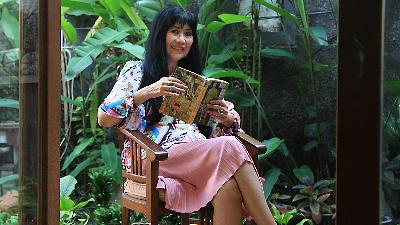
Julia Suryakusuma received an award from the Kingdom of Belgium for her struggle to voice human rights through writing. She is uncomfortable with being called a feminist.

The ministry of health clarifies a sentence on the article Vaccine Opportunist in Tempo English, 22-28 March, 2021 issue.
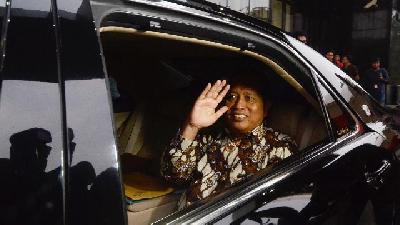
Several rectors are still in office despite having committed plagiarism. They have the support of education ministry officials
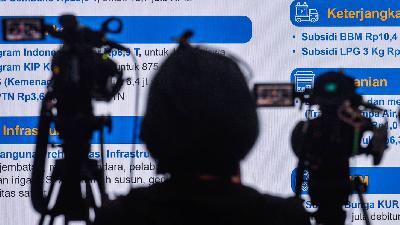
Media companies are experiencing upheaval due to the rapid changes in the business landscape. The industry is moving towards a new equilibrium.
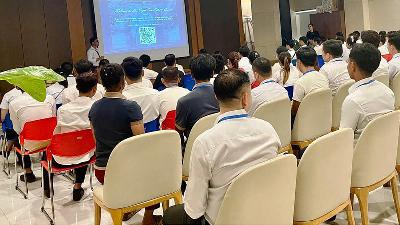
Victims of human trafficking for online gambling and scamming in Cambodia claimed of being forced to work 12-hour shifts and being beaten. Recruitment is still ongoing.

There will be a wave of layoffs at Tokopedia as a result of inefficient practices. This is the result of government policy rife with conflicts of interest.
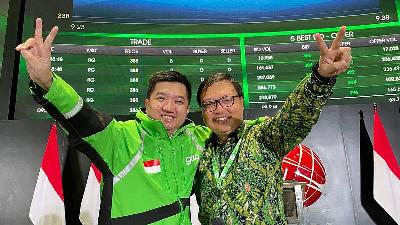
The founders of GoTo and Tokopedia sold their shares. New investors now have control of ownership.

Tokopedia made significant cuts in its workforce following its business consolidation with TikTok. A consequence of inefficient business operation.
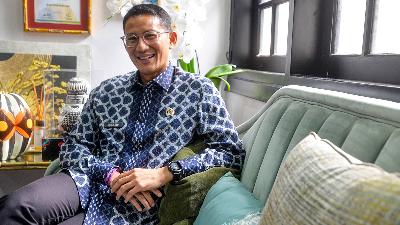
Tourism and Creative Economy Minister Sandiaga Salahuddin Uno assures that the tourism fee will not be imposed on plane tickets.

TikTok Shop’s acquisition of Tokopedia changes the Indonesian business map. It is not clear how small and medium enterprises will be protected.

GoTo CEO Patrick Waluyo reveals the story behind the selling of Tokopedia shares to TikTok. How much profit did GoTo get?
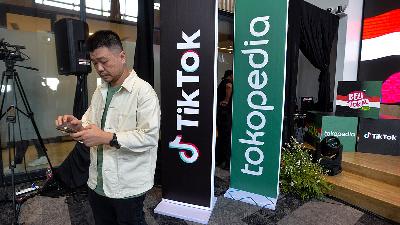
The integration of TikTok Shop with Tokopedia will reinforce GoTo’s business. Indonesia’s e-commerce competition landscape is changing.
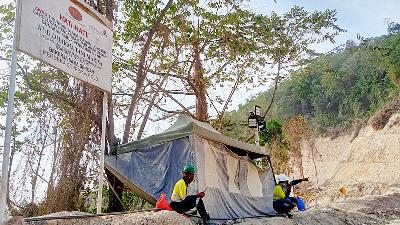
Sandiaga Uno and Garibaldi Thohir’s company is in conflict with local miners. The amount of compensation is considered inadequate.

The news in our media is problematic. Why is that?
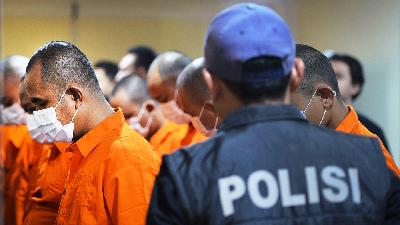
The police exposes Indonesian kidney trafficking network in Cambodia. The victims are enticed through social media.
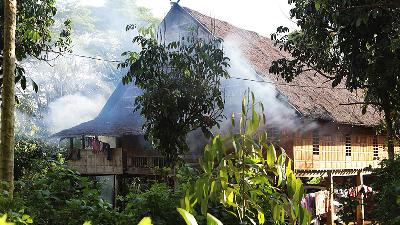
The Kajang indigenous community is considered the best forest guardian. They face threats from the regulations, plantation companies and modernization.

Policymakers love the power of social media. Sometime, they prioritize improving their images over tackling the roots of problems.
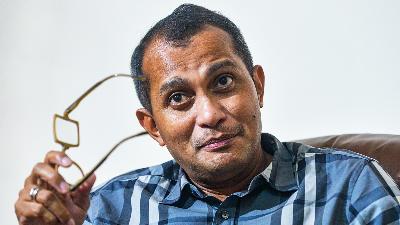
Deputy Minister Eddy Hiariej explains the gist of allegations of accepting gratification amounting to Rp7 billion. He admits to acting as mediator.

After reporting alleged sexual violence on the campus, LPM Lintas, student’s media, was suspended by the Rector of Ambon IAIN.
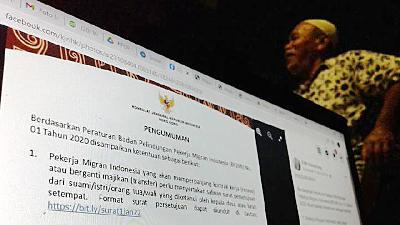
The Indonesian Consulate-General to Hong Kong requires a written permission from a legal guardian for migrant workers planning to extend their work contract. It sparks protests from the workers.

The number of deaths from Covid-19 in India has soared following a religious celebration. Unfortunate result of populist decisions taken based on electoral interests.

The Palace appears to be mobilizing influencers and ‘buzzers’—this era’s social media propagandists—to further its agendas. They actively posted during the KPK Law revision and more recently about a potential cabinet reshuffle. They may have received payment for their work on social media.

Pramadina Religion and Democracy Studies Center recommends the Religious Harmony Forum to focus not on issuing recommendation for establishment of place of worship, but rather facilitating interfaith dialogues.

The Nuclear Energy Regulatory Agency contained and disposed of land exposed to radiation after two weeks from finding some cesium-137 in the area. The initial plan was to quietly remove the waste.
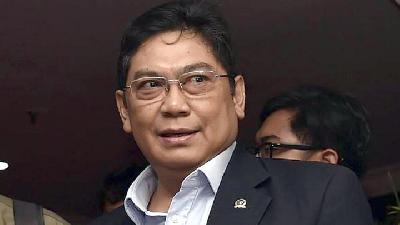
IN a House of Representatives (DPR) plenary session on Thursday, September 5, Deputy Speaker from the Indonesian Democratic Party of Struggle (PDI-P), Utut Adianto, asked for factions to express their stance in regard to the revisions of two laws—one of which is the Corruption Eradication Commission (KPK) law—in writing. All 10 faction representatives agreed.

Disinformation through social media must be countered. However, limiting communication should be done with caution.
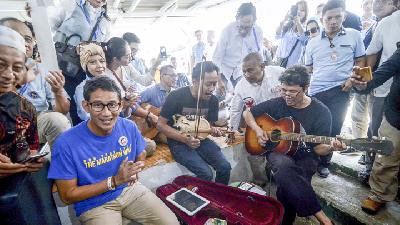
Sandiaga Uno is clocking in much more campaign mileage than Prabowo Subianto. Much needed to boost their electability.

Media Literacy
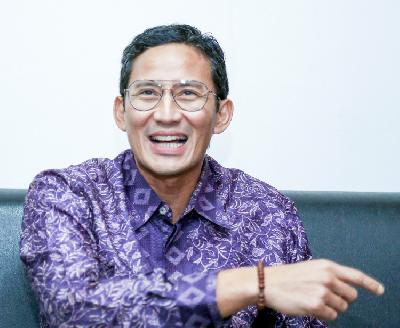
After less than a year as Deputy Governor of Jakarta, Sandiaga Salahuddin Uno has given up his position in order to become Prabowo Subianto’s vice-presidential running mate.
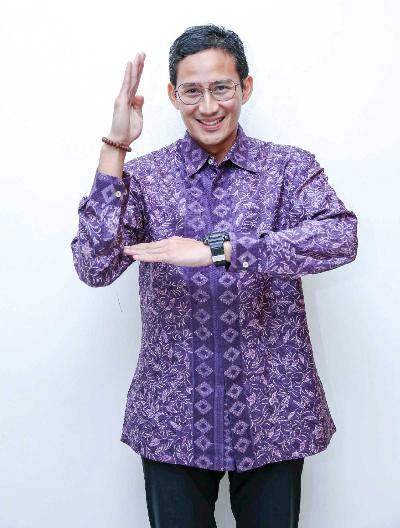
SANDIAGA Salahuddin Uno accepted a new duty last February: becoming Chair of the Gerindra Party 2019 Presidential Election Campaign Team. Sandiaga, 48, was personally appointed by Prabowo Subianto, the party's general chair.

The police are currently holding a suspect in the investigation into embezzlement at Japirex. Jakarta Deputy Governor Sandiaga Uno, who is also been reported for fraud, is implicated.

Young Guardians
Some young people from the Talang Mamak tribe in Riau have formed a group to patrol their customary forests. Illegal loggers can be caught red-handed.

For six weeks, Siti Aisyah hung out with people now said to be North Korean agents. She was caught up in a plot to kill Kim Jong-nam, eldest son of the late Kim Jong-il, the former Supreme Leader of North Korea. Kim Jong-nam was once believed to inherit his father's mantle. Together with Doan Thi Huong, a citizen of Vietnam, Siti went through 12 rehearsals in seven locations, including in Cambodia, to kill Kim Jong-nam at Kuala Lumpur International Airport 2 on February 13. Now Siti and Doan Thi Huong are being held in a Malaysian prison on charges of premeditated homicide.

We must support every endeavor to improve the Indonesian press, including setting up standards by the Press Councilas regulated by Press Council Regulation No. 4/2008. The 17-point guideline, if implemented properly, will make the press function as a medium of information, education, entertainment and social control, as well as being a truly healthy commercial entity.
At the time, the Press Council enjoyed widespread support. Its standards were discussed by organizations, press people and the leaders of media organizations. The Press Councilthen headed by former Gadjah Mada University Dean Ichlasul Amalwas seen as having achieved something important. Its role was specified in Article 15 (f) of Law No. 40/1999 on the Press, i.e. to facilitate press organizations in drawing up regulations and improving the quality of journalism.

Beef imported from India has entered the local meat market. Local cattle breeders and traders are struggling.

False and misleading news reports are being spread on social media. Some are making money from ad revenues on the Internet. Some of it is fallout from a divisive presidential election.

Conservation is one of the best ways to keep history alive. Yet, many historical sites and ancient artifacts in Indonesia are badly preserved and neglected. Historical sites and museums conservation director at the education and culture ministry, Harry Widianto, claims that the government is doing its best to conserve these sites and artifacts. Among other things, it has restored, conserved and improved an inventory system. The government has also appointed experts to tend to historical buildings.
Last October, the government selected five of those sites and awarded them as the best conservation programs in an effort to raise the quality of conservation management. Even so, the government still has difficulty in monitoring and tending to all historical sites, which as of 2013 numbered some 66,513 and were tended to by only 2,988 conservationists. This is why, Harry said, the government is encouraging community members to be involved in conservation efforts in their respective locales. "If the effort comes from the community, it will be more effective and enduring," Harry told Tempo English reporter Isma Savitri in his office two weeks ago.

The legal defeat at the Palembang District Court late last year did not deter the environment and forestry ministry to continue filing lawsuits against land-torching companies. This time, the ministry targeted National Sago Prima.
The ministry is accusing the subsidiary of Sampoerna Agro company of setting fire to 3,000 hectares of industrial plantation forest at Tebing Tinggi, Meranti, Riau. The ministry lodged its lawsuit with the South Jakarta District Court in accordance with the domicile of National Sago's head office at Sampoerna Strategic Square on Jalan Sudirman in Central Jakarta. "The lawsuit this time is much more clear. Our evidence is solid. We're optimistic that we'll win," said Jasmin Ragil Utomo, director for environment dispute settlements, last Thursday.

2015 was always going to be a year of going 'back to basics' for the Indonesian media industry. The 2014 election year saw a media landscape in which many companies clearly supported presidential candidatesalthough to what extent and why varied. The influence of media owners has been exacerbated by the increased concentration of media industry through convergence, with proprietors who previously only owned one platform (such as print, radio or television) building large, powerful multi-platform oligopolies. Put simply, Indonesia's big media companies are getting bigger in the digital era, and the influence of owners has heightened as their companies increasingly dominate the media landscape. The arrival of new 24-hour television news stations in 2015, such as Hary Tanoesoedibyo's iNews and Chairul Tanjung's CNN Indonesia, continues this trend.
This year saw many news organisations begin their 'one newsroom' modelwhere reports from 'content providers' (previously known as 'journalists') are shaped by 'content curators' (previously known as 'editors') to create 'multiplatform digital stories' (what we used to call 'news'). This process is still in transition phase, so 2016 will be a year of experimentation as news practitioners attempt to figure out the best model of journalism, networked content, marketing and advertising for their increasingly digitally driven companies.

The positive trend on digital economics has caught the attention of President Joko Widodo. This lucrative business has been expanding in the past few years and is expected to continue growing in line with the increasing numbers of Internet users with their smart-phones. The Indonesian E-Commerce Association (idEA) recorded at least US$12 billion worth of online commerce in 2014. This has led the President to urge Communications and Information Minister Rudiantara to prepare the necessary steps to ensure Indonesia can benefit from the rapid growth of online businesses.
Rudiantara himself is optimistic that digital transcations in Indonesia can reach US$137 billion or eight to nine percent of national gross domestic product (GDP) by 2020. "We must establish the rules of the game so Indonesia can benefit from it," he said. Rudiantara shared his views on this new economic phenomenon with Tempo reporters Akbar Tri Kurniawan and Ursula Florence at his residence in Jakarta last week. Excerpts:

As protests rejecting the Uber car hire company grew louder, Karun Arya found himself coming more frequently to Jakarta. Last month, this spokesman for Uber Southeast Asia and India was in Jakarta twice in a month. Now, he must be in Jakarta every week to attend meetings.
But Arya is used to facing rejection and protets, as he has in places like India and the Philippines and he is optimistic he will overcome these challenges in Jakarta. "I would like to come here for sightseeing, not to deal with problems," said Arya, when he was interviewed by Tempo reporter Syailendra Persada in Jakarta, last week.

THE 'guardian' of Jaam Island, part of a conservation zone where shark hunting is banned, lives in South Misool District, Raja Ampat Regency. His name is Andi Dharmawan, but he is better known by his nickname, Cagi, or Oom (uncle) Cagi. His skin is tawny from long hours in the sun, and he speaks with booming erudition.
Forty-one years old, he was born in Bone, South Sulawesi, but has been in West Papua since childhood. Jaam Island is in the Regional Waters Conservation Area (KKPD) of Southeast Misool, the largest conservation zone in Raja Ampat. The area covers 366,000 hectares, and includes a chain of ancient limestone islands and a well-preserved saltwater lake. A 10-kilometer radius from Jaam Island have been declared off-limits to fishing. It is known as a breeding ground for a variety of fish species.

THE Energy and Mineral Resources Ministry has an ambitious plan for next year: raising the budget for the development of renewable energy by 10 times. "The future of Indonesia's development depends on seeking and building renewable energy. We can no longer rely solely on fossil fuel energy, which is bound to become scarce," said Dadan Kusdiana, director of the ministry's section on bio-energy.

THE new mining law has left Martiono Hadianto, chairman of the Indonesian Mining Association and CEO of Newmont Nusa Tenggara, wondering. "What is the government's objective?" he asked. He argues that the law is not aligned with President Joko 'Jokowi' Widodo's speech at APEC, which was to invite more investors to Indonesia. Martiono recently shared his views on the current mining conundrum to Tempo English journalists Sadika Hamid and Amanda Siddharta.

THE incident happened when comedian Ari Kriting was still studying Urban and Spatial Planning at the National Institute of Technology in Malang, East Java. For his studies, Ari used to gather data on land clearance in Kalimantan, East Nusa Tenggara and even as far as Papua. He was shocked to discover that many of the nation's islands were still very undeveloped. "The people's lives are sub-standard," said Ari, whose hometown is Kendari in Southeast Sulawesi. His experience in visiting different areas led him to become a keen observer of the flawed development in eastern Indonesia.

FOR months William Tanuwijaya kept a secret close to his chest: the operating funds of his company, Tokopedia, were set to run out this November. Dozens of candidate investors tried to approach him. He knew he had to carefully think over their offers before making a decision.
Then a very special invitation arrived on his desk in early October. It came from Masayoshi Son, founder of Japanese telecommunication and Internet company SoftBank Corp. William has long idolized Masayoshi. That was why, without needing much time to think it over, he flew to Tokyo to take up the invitation.

Australia has once again caused controversy with its stance on refugees. Australian Immigration Minister Scott Morrison signed an agreement with Cambodian Interior Minister Sar Kheng to resettle refugees from Nauru island in the Pacific to Cambodia. In a joint press release, Morrison said Australia would use its expertise and experience to assist Cambodia to strengthen settlement support provided to refugees.
He also said Australia would bear the costs of the arrangement. "Including initial support to refugees, and relevant capacity-building for Cambodia to ensure it has the appropriate resources to receive and integrate the refugees successfully," he added. Previously, he had said that financial aid of AUS$40 million would be provided in the course of four years.

Sidney Jones*
Ayman Al-Zawahiri's announcement last week that al-Qaeda had established a new franchise on the Indian subcontinent will have little effect on Southeast Asia. It is the Islamic State (IS), formerly known as ISIL or ISIS, that is the problem for Indonesia, because unlike al-Qaeda, it is attracting young people by social media and because many of its supporters here support violence at home.
Does that mean we can safely ignore al-Qaeda India? Not necessarily, because it raises some interesting questions about where extremism in Indonesia is headed. We can start by looking at al-Qaeda's historic links to Indonesia and how they have evolved.

At the recently-concluded Global Media Forum in Bali, one issue that was raised in almost all of the sessions was media literacy. Wikipediathat most accessible although not always accurate source of information todaydefines it as a repertoire of competencies that enable people to analyze, evaluate, and create messages in a wide variety of media modes, genres and formats. It goes on to explain that teaching media literacy encourages people to ask questions about what they watch, hear and read. It offers opportunities for people to critically analyze messages, such as identifying the author, the purpose and point of view and to detect whether they contain propaganda, censorship and bias in news and public affairs programming. In addition, being media literate would help people understand structural features such as media ownership or how it is funded. Most importantly, it helps citizens to be aware of their rights as media consumers to voice their views and concerns over what is being published.
In Indonesia, as people increasingly turn to the various alternative media for their sources of news and information, the urgent need for media literacy in Indonesia was indicated during the recent contentious presidential election. When push came to shove, the smear campaigning came to the fore. Enough voters actually believed the outrageous information that was published by a tabloid which was clearly intended as a defamation of the character of one candidate to benefit his rival. Fortunately, the tables were able to be turned when an opposing tabloid countered the charges by equally exaggerated information. Then there was the television stations owned by politicians supporting one or the other candidate, and blatantly showing their bias.

ROSARITA Niken Widiastuti did not immediately start speaking. She kept squeezing the tissue paper in her hand, as if plucking up the courage to open the conversation. "Look, let's not discuss threats," said Niken, the executive director of state-owned Radio Republik Indonesia (RRI) broadcasting station. She was on her way to Aceh, to close the Qur'an Reading Contest, along with Minister of Administrative Reform Azwar Abubakar and Aceh Governor Zaini Abdullah. "This is an annual affair of RRI," explained Niken.
She is very aware that her agency is under the public spotlight. RRI's quick count of the recent presidential polls seems to have triggered sharp debate. She now faces the prospect of being summoned by the House of Representatives' (DPR) Commission on Information, whose chairman, Mahfudz Siddiq, maintains that RRI's quick count was not part of its mandate.

The National Council for Peace and Order (NCPO), the ruling Thai military junta led by General Prayuth Chan-ocha, last week set up five panels to monitor activities in the local and international media. NCPO deputy chief, Police General Adul Saengsingkaew, said that the panels would prevent dissemination of false information and each panel had different responsibilities in monitoring content in radio, television, print and online media.
"Any media found spreading inappropriate content will face criminal charges," he said as quoted by the Bangkok Post on June 26. Pol. Gen. Adul added that they would not pursue legal action if journalists complied with the law and performed their duties by presenting information to the public in a fair and objective manner.

In a celebratory summit, ASEAN and India elevated their relations to a strategic level. But people-to-people connectivity still needs some work.

This is a portrait of how things have changed in the first elite neighborhood in the Dutch Indies. The area in question was formerly called Nieuw-Gondangdia. Later its name was changed to Menteng. This is where the wealthy lived, from top government officials and governors to ambassadors and businesspeople. Over the years, however, its beauty has faded. It has grown in an irregular fashion, due to the inconsistent application of city regulations, as well as its residents' lack of concern for the environment.
On this year's anniversary of the city of Jakarta, which coincides with Menteng's 100th anniversary, Tempo attempts to write extensively about Indonesia's first modern tropical residential area. This is where the Indische (Indies) architectural style originated. Not many buildings of this style exist today. Now it is a crowded, polluted area, used by motorists avoiding carpool roads. Menteng is a typical example of Jakarta's muddled zoning regulations.

Tjokro regularly expressed his views in the Oetoesan Hindia daily. His writing style was emulated by many, including Sukarno.

Rupert Murdoch shut down his News of the World weekly, which used phone-hacking to break a number of exclusive news stories. Is this the end of the Murdoch media empire?

High mountains, deep valleys and dense forests can no longer impede the flow of information. Even without electricity, radio and television keep broadcasting a variety of news and information to the remotest areas in Indonesia. The 1998 reforms expanded the scope of media community, raising the number of radio stations from 700 to 2,000. Villages became an integral and active part of the world of information. Farmers, tailors, fishermen and many others, were all transformed, becoming 'journalists and broadcasters' on the side. An exclusive report by Tempo English Edition from Papua, Sulawesi, the Nusa Tenggaras and Flores.

On June 1, Indonesia became the fifth ASEAN member, after Malaysia, Myanmar, Thailand and Vietnam, to ratify the ASEAN-India Free Trade Agreement, signed earlier this year. What are the prospects and challenges of doing business with the world's largest democracy? Yuli Ismartono traveled to India recently and filed this report:

Indian entrepreneurs are busy looking at Indonesia. With the number-two growth rate in the world, this country is looking for fresh areas of business. However investment value is still low.

The Supreme Court issued a new rule on mediation. As one of its plus points, this process is open to the level of review.

The case file on the First Media case has been handed over to the Attorney General’s Office. A mechanism to prevent collusion between officials and taxpayers is urgently needed.

GOVERNOR Abdullah Puteh was on the front pages of newspapers for weeks in recent months, linking him to corruption in the scandalous purchase of a helicopter and a power generator for the Aceh provincial administration. The Corruption Eradication Commission has named him a suspect in the case. Now the governor is back in the news with reports of his involvement in the Ladia Galaska projectthe controversial construction of a road that cuts across the Leuser Ecosystem Zone in Central Aceh. The project has spent Rp250 billion of the total Rp950 billion allocated under the National Budget. Non-governmental organizations charge Rp26.9 billion of the expenditure has not been properly accounted for. TEMPO traces the ins and outs of the controversy and the impact of the project on the environment.

Will President Megawati inaugurate Ladia Galaska, a road project many maintain will have a disastrous effect on the environment in Aceh?

The three-page letter, written in a straightforward manner, criticizes the environmental impact analysis prepared for Ladia Galaska.

Five years of reformasi have seen the establishment and bankruptcy of a number of media groups. Conglomerates have begun to enter a sector formerly marked by idealism.

Irregularities in spending by a subsidiary of Semen Gresik has delayed the work of its auditors and resulted in its failure to submit its financial reports to Bapepam.

Many Cambodian war criminals remain untouched by law. Can the ICC break the culture of immunity of these men to prosecution for their crimes against humanity?

From every corner of the worldLondon, New York, the Cambodian hinterland or rural Egyptthey have launched their works, capturing the attention of a mesmerized world. A few decades ago, their predecessorsR.K. Narayan, G.V. Desani and Anita Desaialso produced great literary works, unfortunately doomed to dwell in the silent and isolated world at home. Abroad, they became mere exotic items punctuating the catalogs of quality foreign publishers. The revival began in the 1980s, when Salman Rushdie rocked world literature with his Midnight's Children. Following him, a great array of new writers and their works, have come to light and shot to fame. Among them are Amitav Ghosh, Vikram Seth, Amit Chauduri, Hanif Kureishi, Ardashir Vakil, Jhumpa Lahiri, Kiran Desai, Arundhati Roy and Shauna Singh Baldwin. Born to Indian or Pakistani middle-class families, they are educated and speak English as fluently as they do their mother tongue. In most cases, their English is even more fluent than their native language. These are the writers of post-colonial Indian literature, who have managed to secure respectable places in the arena of world literature. Assisted by the attentions of British and American publishers, their diaspora literature has developed a voice, and speaks to the world. The following article dissects this phenomenon. TEMPO reporter Dewi Anggraini interviewed two of them, Amitav Ghosh and Hanif Kureishi, at a literary festival in Hong Kong recently.

It may well be the case that the intellectual level of a particular nation is measured by the number of its thinkers that you can find in an encyclopedia. Unfortunately, there are not so many Indonesian thinkers to be found in encyclopedias even though Indonesia is the largest Islamic country in the world. Now John L. Esposito's Oxford Encyclopedia of the Modern Islamic World has been translated into Bahasa Indonesia and is published by Mizan. We took the opportunity of having a look at Esposito's encyclopedia and also ask why so few of our thinkers have entries named after them

It may well be the case that the intellectual level of a particular nation is measured by the number of its thinkers that you can find in an encyclopedia. Unfortunately, there are not so many Indonesian thinkers to be found in encyclopedias even though Indonesia is the largest Islamic country in the world. Now John L. Esposito's Oxford Encyclopedia of the Modern Islamic World has been translated into Bahasa Indonesia and is published by Mizan. We took the opportunity of having a look at Esposito's encyclopedia and also ask why so few of our thinkers have entries named after them.

Honda has introduced a new moped at a very competitive price. Is there concern the disaster that occurred in Cambodia could happen in Indonesia?

Clarification from the Lake Poso customary community and the mismanagement of food.

The shortage of coal for domestic power plants is the result of poor management from PLN and the government. An export ban will not solve the problem.
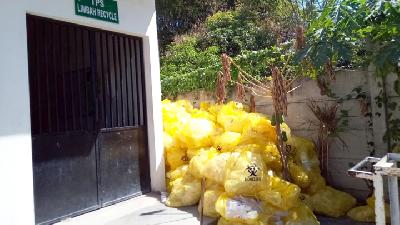
There are problems with the entire management process for hazardous and toxic waste from hospitals in East Java. It is endangering public health.

The cabinet’s mismanagement has sent the garlic price to go through the roof. The inter-ministerial coordination and the market mechanism need to be fixed.

Not many filmakers have delved into the lives of Indonesians in remote areas. But seasoned producer Mira Lesmana sees a wealth of interesting stories from the outer islands. One of Mira's films, Atambua 39 Celcius (2012) explores the culture of West Timor in East Nusa Tenggara (NTT) province, not a frequently visited area. The film uses the local Tetun dialect, which is fast disappearing. "I have this wish to preserve something before it changes or disappears," said the founder of Miles Films production company,
NTT is the background of her 2014 film, Pendekar Tongkat Emas (Knight of the Golden Rod), which was produced in Waingapu, Sumba. "I happen to be in love with NTT, a region with a unique character. I have travelled to the islands of Flores, Timor and Sumba, but I have yet to visit the smaller islands, like Sabu and Rote," said 50-year-old Mira.

The state-owned oil and gas company, Pertamina, built up a fleet of tankers during the time of Ibnu Sutowo, Pertamina's first CEO. They almost went bankrupt due to mismanagement.

The Attorney General will soon terminate the investigation into alleged corruption in the sale of two Pertamina tankers involving Laksamana Sukardi. The DPR is questioning the decision.

There may well be a soft chair in his office, but Laksamana Sukardi sits in the hot seat. This is because he appears to have the glamorous job of administering what looks like unlimited amounts of money. As the State Minister for State-Owned Enterprises (SOEs), Sukardi, 46, is not only in charge of over 130 state-run businesses, but he is also responsible for the overall performance of the Indonesian Bank Restructuring Agency (IBRA). In sum, these state-owned assests have a combined worth of nearly Rp1,500 quintillion (figure followed by 18 zeros)—as compared with the 2002 national budget, which is only worth Rp300 quintillion.

State Minister Laksamana Sukardi has the mammoth task of optimizing state-owned enterprises as well as the Indonesian Bank Restructuring Agency. In addition, he faces various obstacles, including those posed by the legislative.
Independent journalism needs public support. By subscribing to Tempo, you will contribute to our ongoing efforts to produce accurate, in-depth and reliable information. We believe that you and everyone else can make all the right decisions if you receive correct and complete information. For this reason, since its establishment on March 6, 1971, Tempo has been and will always be committed to hard-hitting investigative journalism. For the public and the Republic.